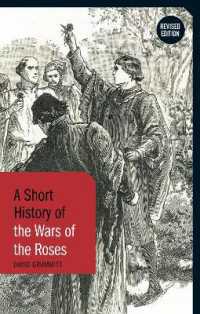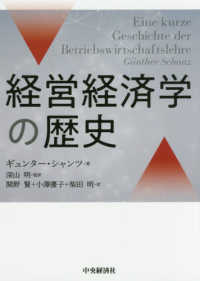- ホーム
- > 洋書
- > 英文書
- > Religion / Ethics
Full Description
This volume looks beyond the myth of José Martí by critically exploring economic thoughts found in his writings; specifically, how they developed and how they were influenced by his position between a declining Spanish empire and a rising US empire. This book demonstrates how Martí is among the few who transcended regional and national borders, thus belonging to all of humanity.
Miguel A. De La Torre argues that Martí envisioned a way of being - specifically a Cuban way of being beyond Spain and the United States. His writing was among the first in history to put into prose his dream of a postcolonial existence. More than simply an intellectual exercise; he was among that breed of scholar-activists who attempted to create, con un cuchillo en la boca, a postcolonial existence through a life-long dedication to praxis. He also was among the first to see and warn the Américas of the growing and unquenchable covetous appetite of the United States.
This book argues that the major struggles and aspirations which the Américas face today can be summarized as everything predicted and written by Martí, who gave voice to the dream of the disenfranchised. This was established by calling for the construction of a liberated society based on social economic justice, racial harmony, labor rights, and self-determination. De La Torre provides insight to Martí's ethical way of being which facilitated tackling the wider political world from an unapologetic Cuban social location.
Contents
Series Introduction
Preface
Notes Concerning Translation
Introduction
1. "Miserable Memories"
2. "A Harsh and Selfish Civilization"
3. "Eat Agony and Drink Anguish"
4. "Winter of Anguish"
5. "Nuestro Vino"
6. "La otra América"
Timeline
Bibliography








